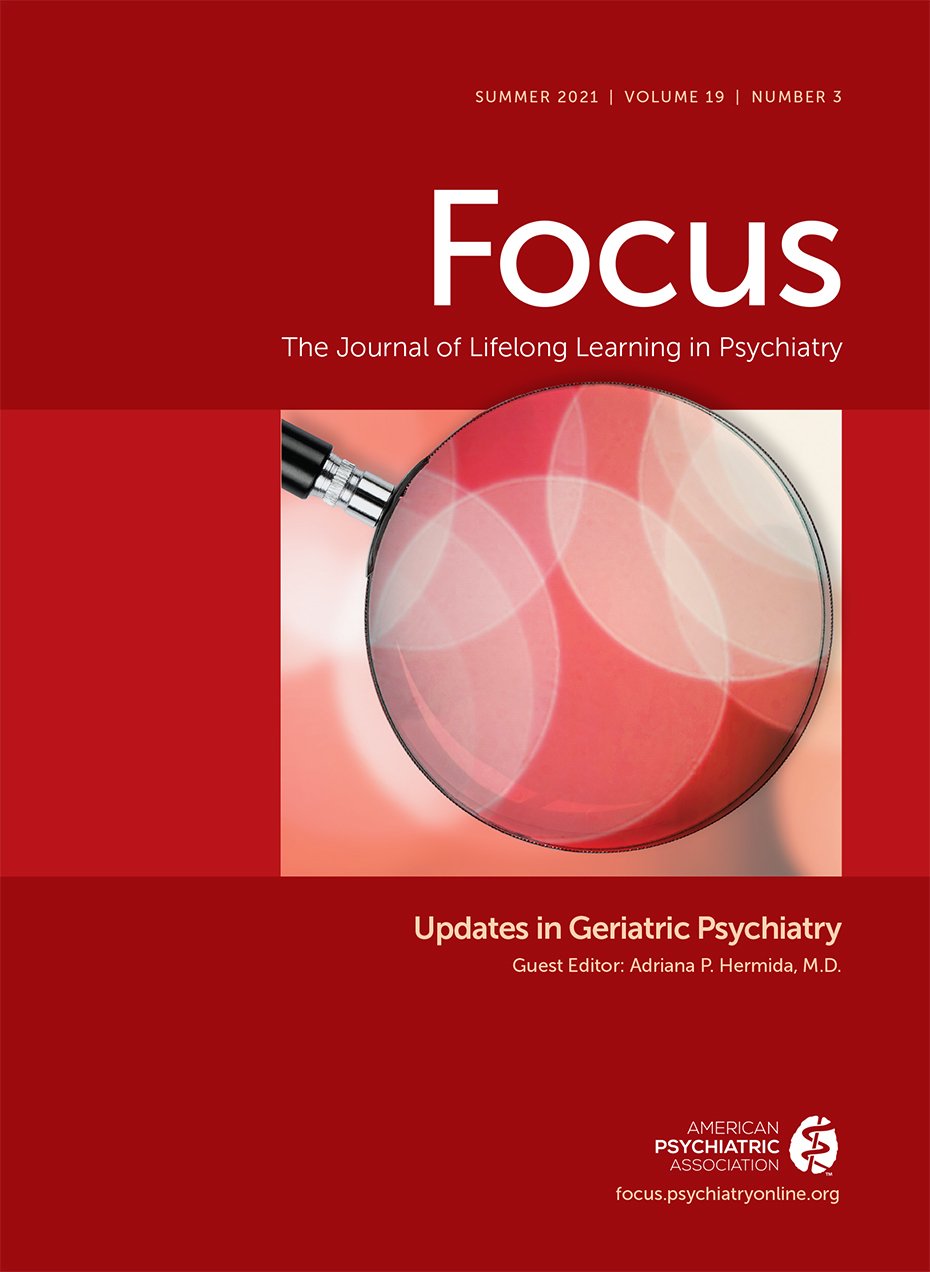Keeping Health Care Professionals Current on Geriatric Knowledge
I am humbled and delighted to be the guest editor for this special issue of Focus on geriatric psychiatry. As the global population lives longer, mental health professionals would be wise to keep abreast of principles of geriatric psychiatry. Indeed, our elderly are the most rapidly expanding segment of the population worldwide. According to the U.S. Census Bureau (https://www.census.gov), the population over age 65 will more than double from 46.2 million older adults in 2014 to 98 million by 2060. During the same period, the number of older adults with mental illness is expected to double to 15 million individuals. This demographic transition will increase the current shortfall of health care providers with geriatric expertise, especially those with geriatric mental health knowledge. To add to the overwhelming statistics and put these facts in perspective, Dr. Widera commented in his article (1) that the oldest of the U.S. “baby boomer” generation turned 65 on January 1, 2010. Every day for the next 19 years thereafter, another 10,000 baby boomers will turn 65. By 2030, the country's population of “senior boomers” will double to an estimated 71 million individuals (1). These numbers reflect the need for professionals to stay current with their geriatric knowledge and be prepared for future mental health demands in this cohort.
This issue targets the educational needs of the general psychiatrist and includes an extensive review of topics that clinicians face when caring for aging patients. It aims to be comprehensive, covering topics such as depression, dementia, palliative care, substance abuse, and personality disorders. It highlights the unique presentations of these mental health conditions in the elderly and offers practical diagnostic principles as well as covering multiple aspects of clinical management.
A comprehensive review of late-life depression by Drs. Husain-Krautter and Ellison highlights the essentials of late-life depression and reviews how depression in the elderly differs in many dimensions from the depressive syndromes encountered in younger adults. The authors discuss different mechanisms of action and etiologic theories, assessments, and practical treatment approaches, including effectiveness of lifestyle interventions. It concludes with a recommendation for a future DSM specifier for depression in later life to differentiate it from other depressive syndromes in younger patients and avoid underdiagnosis of depression in the elderly.
The article by Dr. Jones, an update on major neurocognitive disorders, includes an extensive review of Alzheimer’s disease, frontotemporal degeneration, and alpha-synucleinopathies (Lewy body disease and Parkinson’s disease). It discusses the advancements in neuroimaging, current understanding of genetic contributions, the development of novel biomarkers and exciting prospective therapies.
The paper by Drs. Potru and Tang on chronic pain, opioid use disorder, and treatment in older adults reminds us of the ongoing urgency of the opioid epidemic. It discusses how overdose deaths remain high despite recent significant efforts in prevention and treatment intervention. It sheds light on the assessment, management, and prevention of pain and opioid disorders within the complexities of the frequent polypharmacy, common pain disorders, and physiological changes in metabolism encountered in geriatric patients.
Dr. Brudey reviews the prevalence and presentation of personality disorders in the elderly and the importance of incorporating an evaluation of cognitive function since cognitive disorders may mimic personality disorders. Similarly, the presence of personality disorders is associated with an increased risk of cognitive decline. Despite the scarcity of trials, Dr. Brudey summarizes the clinical advances in treatment and brings attention to the unique challenges of diagnosing personality disorders in older adults.
In collaboration with Dr. Nagar and Dr. Boazak, we review the intersection of depression and neurocognitive disorders. Late-life depression is frequently associated with cognitive impairment, and due to the frequent overlap of symptoms, it is quite challenging to discern one from the other. As a complement to Dr. Ellison’s discussion, we highlight the importance of recognizing dementia syndrome of depression as a reversible presentation that is important to accurately diagnose. We highlight the need for additional nomenclature in the revision of DSM-5 to include this prevalent condition that can be successfully treated and is frequently misdiagnosed, often with significant impact on patient outcomes and potentially devastating consequences.
The article by Dr. Lapid and colleagues on palliative care provides an overview of end-of-life care when treating older adults with serious illnesses. It discusses the core principles and practices of palliative care and hospice and inspires the mental health providers to hone the ability to have critical conversations at the end of life and recognize when to refer to subspecialists in palliative care. In addition, this timely article includes considerations pertinent to the COVID-19 pandemic.
We hope you will find this issue valuable and find the recommendations and opinions presented in the articles useful in your clinical practice. We especially want to thank our patients, who are our daily inspiration. It is truly an honor to be part of our patients’ journeys as they seek to navigate the challenges of aging with grace and dignity. We are grateful to Dr. Rapaport for his leadership and the opportunity to contribute to this exciting issue on geriatric psychiatry.
1. : Want job satisfaction? Choose geriatrics. Medscape, Feb 25, 2011Google Scholar



